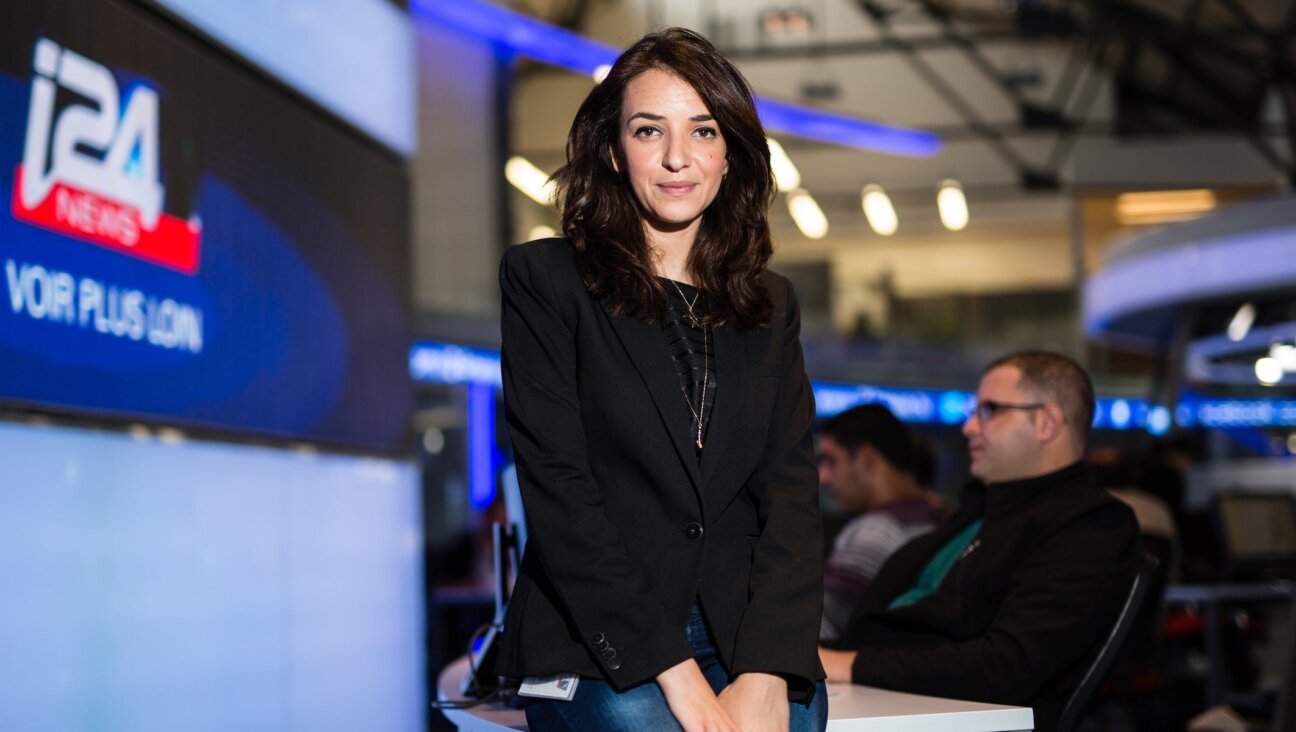How Jewish journalist Ruth Elkrief wound up in the middle of France’s debate over antisemitism and Islamophobia
A far-left leader called the 30-year broadcast veteran Islamophobic for asking tough questions of a pro-Palestinian lawmaker
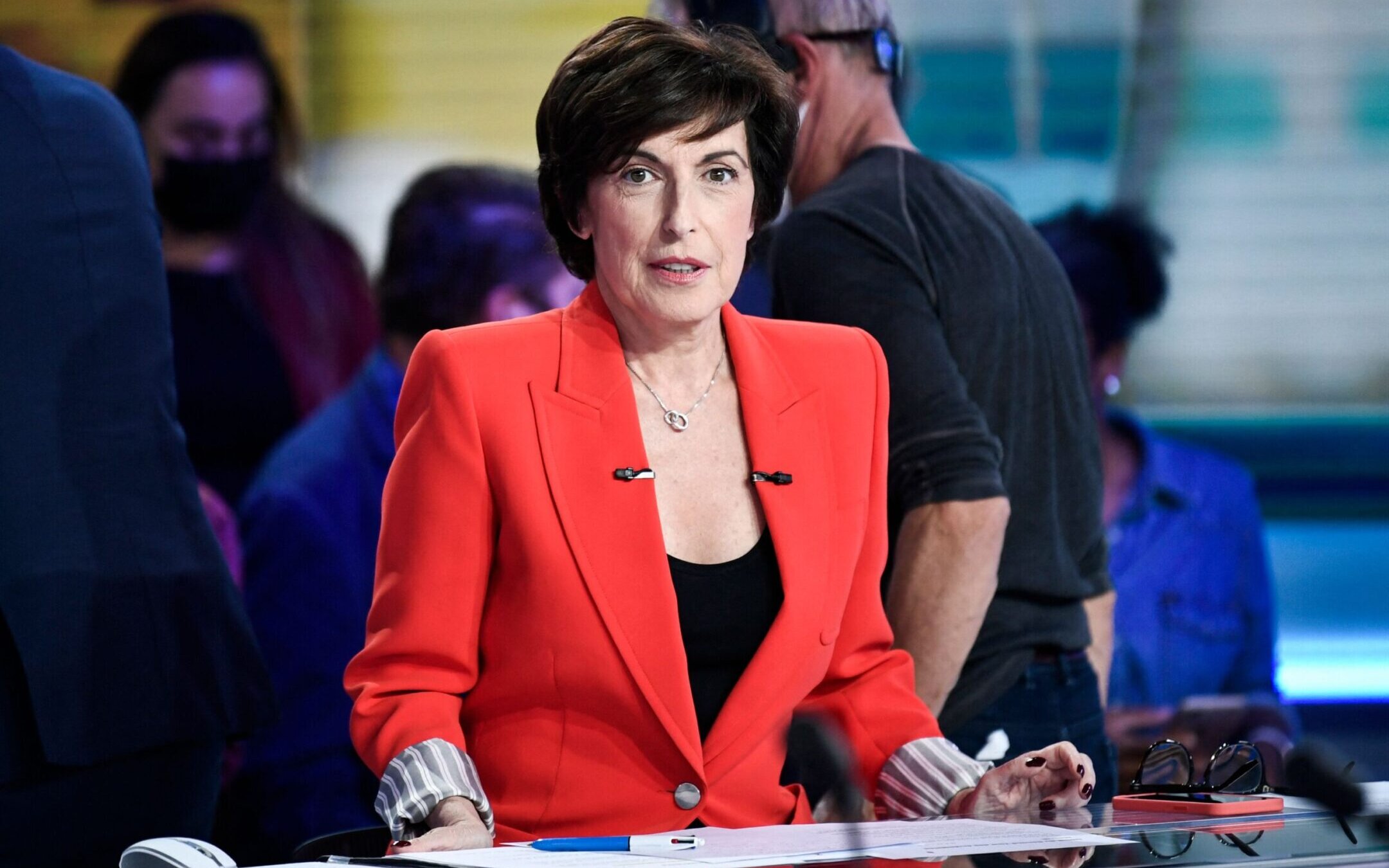
French TV host Ruth Elkrief looks on during a TV debate at LCI television studios in Paris, Sept. 22, 2021. (Photo by Stephane de Sakutin/AFP via Getty Images)
(JTA) — The Jewish French-Moroccan journalist Ruth Elkrief — who has delivered TV news in France for over 30 years — found herself at the center of the story when she was placed under police protection in December.
Elkrief received the security detail after an online attack from the far-left politician Jean-Luc Mélenchon. In a post on X, formerly Twitter, Mélenchon charged her with hatred against Muslims after she challenged one of his colleagues during an on-air interview about the Israel-Hamas war.
“Ruth Elkrief. Manipulator. If we don’t insult Muslims, this fanatic is outraged,” Mélenchon said of the journalist, adding that she “reduces all political life to her contempt for Muslims.”
Mélenchon, leader of the far-left party La France Insoumise, known as LFI or, in English, France Unbowed, posted his comments moments after Elkrief conducted a heated interview with LFI lawmaker Manuel Bompard on her TV channel, La Chaîne Info, on Dec. 3. Elkrief asked Bompard about his party’s refusal to condemn Hamas and its characterization of the militants as “resistance fighters” after their Oct. 7 attacks on Israel. She also asked about the party leaders’ decision to describe Israel’s war in Gaza as a “genocide,” and whether this language might provoke civil unrest in France.
In response, Bompard referenced warnings from the United Nations that the Palestinian people were at risk of genocide without a ceasefire in the Israel-Hamas war. Elkrief in turn quoted the French historian Vincent Duclert, who has said of Gaza’s high death toll, “Even a frightening humanitarian situation is not enough to qualify as genocide.”
Elkrief, who says she “came out” as Jewish to her viewers after Oct. 7, told the Jewish Telegraphic Agency that she merely did her job of debating an interviewee and dismissed Mélenchon’s accusation of Islamophobia. According to Elkrief, she was challenging the positions of France’s far-left political class — not French Muslims, whom she does not believe to be well represented by LFI even though nearly 70% of them voted for the party in the 2022 national elections.
“Most French Muslims don’t support Hamas and they don’t support all these catastrophes,” she said. “They can of course fight for a Palestinian state — and I agree with that — but they are not agreeing with Hamas and terrorism.”
Nonetheless, Mélenchon’s charge prompted a wave of threats against the Jewish journalist and raised an alarm for French Interior Minister Gérald Darmanin. Darminin said he decided to provide police protection because Mélenchon “put a target on the back of Ruth Elkrief, who already faced many threats as a journalist [and] was just doing her job.”
The government was on high alert for domestic attacks responding to the Israel-Hamas war. Mélenchon’s statement came the day after a knife-wielding man killed a German tourist and injured two others near the Eiffel Tower, telling police he was angry about the fate of Gaza and “so many Muslims dying in Afghanistan and in Palestine.”
While it’s typical for domestic attacks to increase in France during conflicts in Israel and the Palestinian territories, a recent surge in antisemitism has been especially pronounced. Darmanin reported over 1,500 antisemitic incidents in the six weeks after Oct. 7 — a three-fold increase from the total documented in all of 2022 — including desecrated Jewish graves and the stabbing of a Jewish woman in Lyon whose door was marked with a swastika.
Whether or not Mélenchon planned for an antisemitic backlash against Elkrief, his choice of language on X was loaded, according to Dorian Bell, a professor researching France’s history of race and antisemitism at the University of California, Santa Cruz.
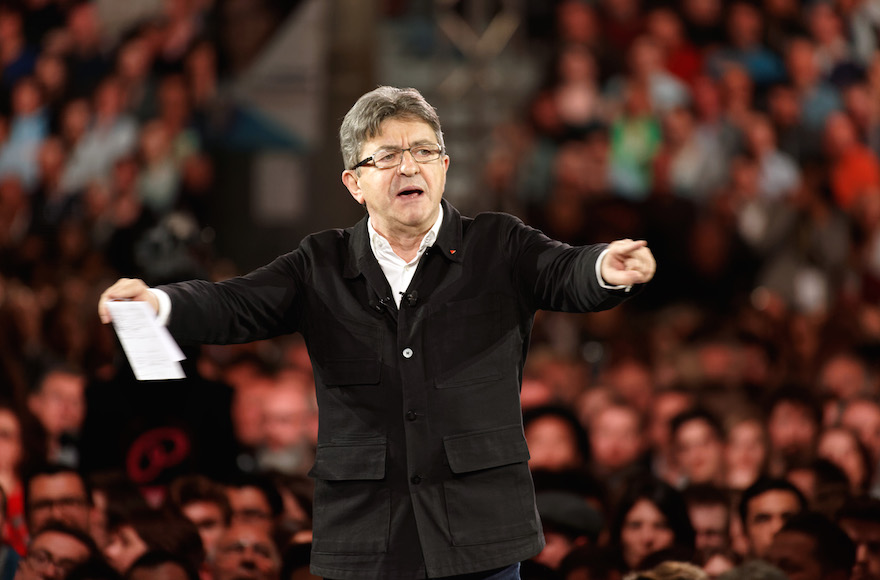
Jean-Luc Melenchon at a campaign rally in Lille, France, April 12, 2017. (Sylvain Lefevre/Getty Images)
“To accuse a Jewish member of the media of ‘manipulation’ arguably draws on long-standing antisemitic tropes about Jewish control of the media,” Bell told JTA.
Mélenchon’s words landed in the middle of a polarizing fallout from the Israel-Hamas War in France, home to one of the largest Muslim populations in Europe (about 5 million) and the world’s third-largest Jewish community after Israel and the United States (about 500,000).
French authorities met the wave of antisemitic incidents with a crackdown on pro-Palestinian rallies. Darminin attempted to impose a blanket ban on demonstrations denouncing Israel’s military campaign, which he declared “likely to generate disturbances to public order.” Although the ban was overturned, local authorities can still block protests on a case-by-case basis, prompting an outcry from some French citizens who accuse the government of suppressing free expression in support of Palestinians.
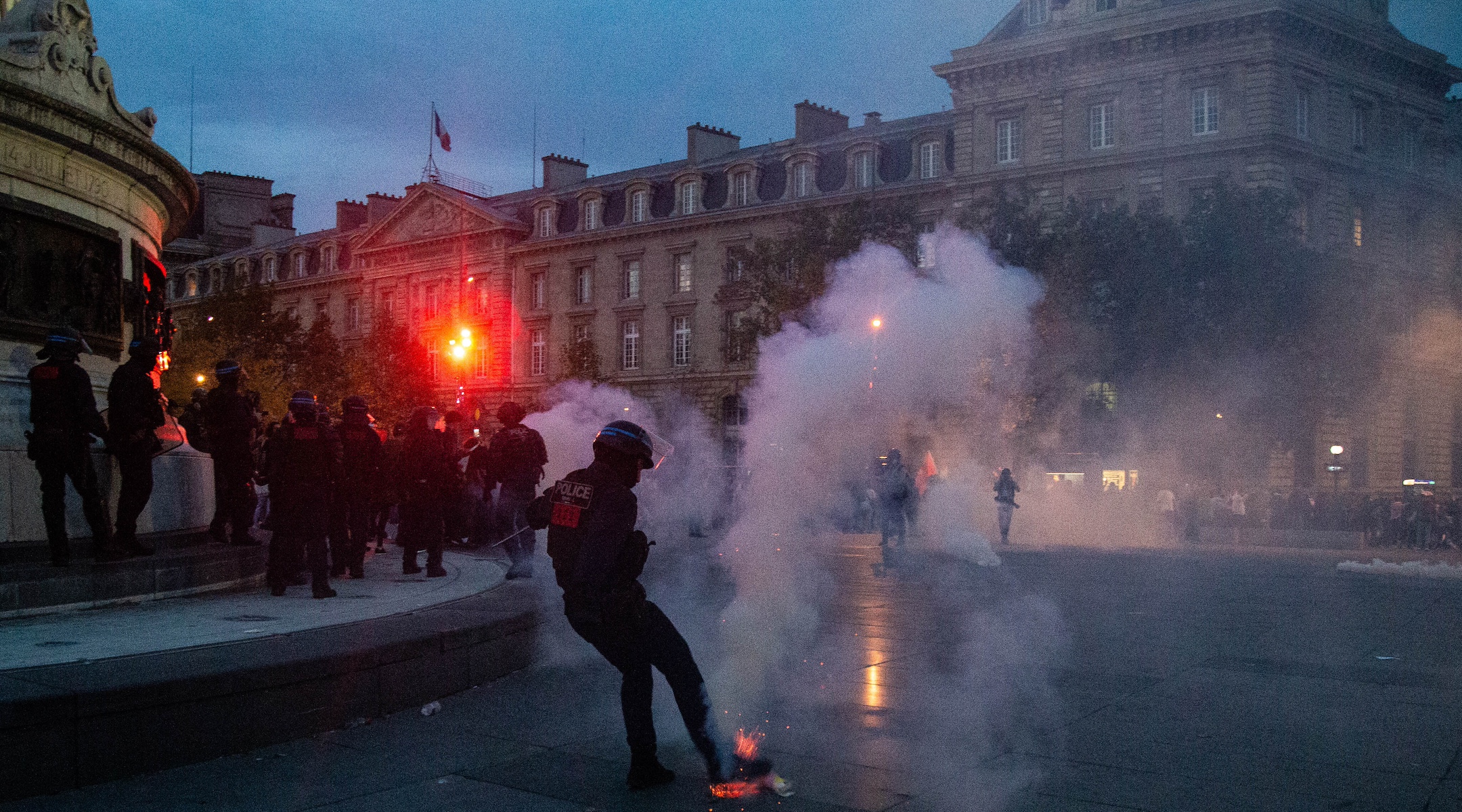
French riot police use tear gas to disperse demonstrators during a pro-Palestinian rally at the Place de la Republique square in Paris, Oct. 12, 2023. (Ibrahim Ezzat/Anadolu via Getty Images)
France’s Jews and Muslims have both experienced a painful recent history, including institutionalized discrimination against Muslim immigrants and Islamic terrorist attacks that targeted a Jewish school in 2012 and a Jewish supermarket in 2015. The reverberations of the Israel-Hamas war in France have further shaped a perception, solidifying for decades, that the country’s antisemitism and Islamophobia can be collapsed into a Jewish-Muslim conflict.
Michel Wieviorka, a Jewish French sociologist who studies violence and terrorism, told JTA there is no evidence that antisemitic incidents are predominantly driven by French Muslims. In fact, most of the perpetrators behind the recent spike in incidents — particularly non-violent ones, such as property damage and graffiti — are unknown. Between Oct. 7 and Nov. 15, 1,518 reports of antisemitic acts resulted in 571 arrests, Darmanin announced in November.
“Nobody knows exactly who is acting,” said Wieviorka. “Many people believe that most of these acts come from people with immigrant origins, but they can also come from the extreme right. For instance, I know some cases of destroyed graves in Jewish cemeteries — these attacks usually come from the extreme right, not from Muslims or Arabs.”
For Elkrief, Oct. 7 marked a turning point both personally and professionally. The 63-year-old journalist was born in Meknes, Morocco, and moved to France with her family when she was a teenager. (A remaining synagogue in Meknes bears her family name.) She started her long career at the French desk of the Associated Press in 1984. She spent 14 years at TF1, the oldest TV channel in France, helped found two news channels — LCI in 1993 and BFM TV in 2005 — and has hosted an LCI show about French politics since 2021.
She is also the great-niece of Chalom Messas, who was Morocco’s chief rabbi in the 1960s and 1970s until immigrating to Israel in 1978, when he became the chief Sephardic rabbi of Jerusalem. Elkrief is part of France’s small Liberal Jewish community and maintains Jewish traditions, keeping kosher at home and gathering the family for Shabbat evenings — including her two daughters and a newborn granddaughter. (Liberal Judaism in France is most similar to Reform Judaism in the United States.)
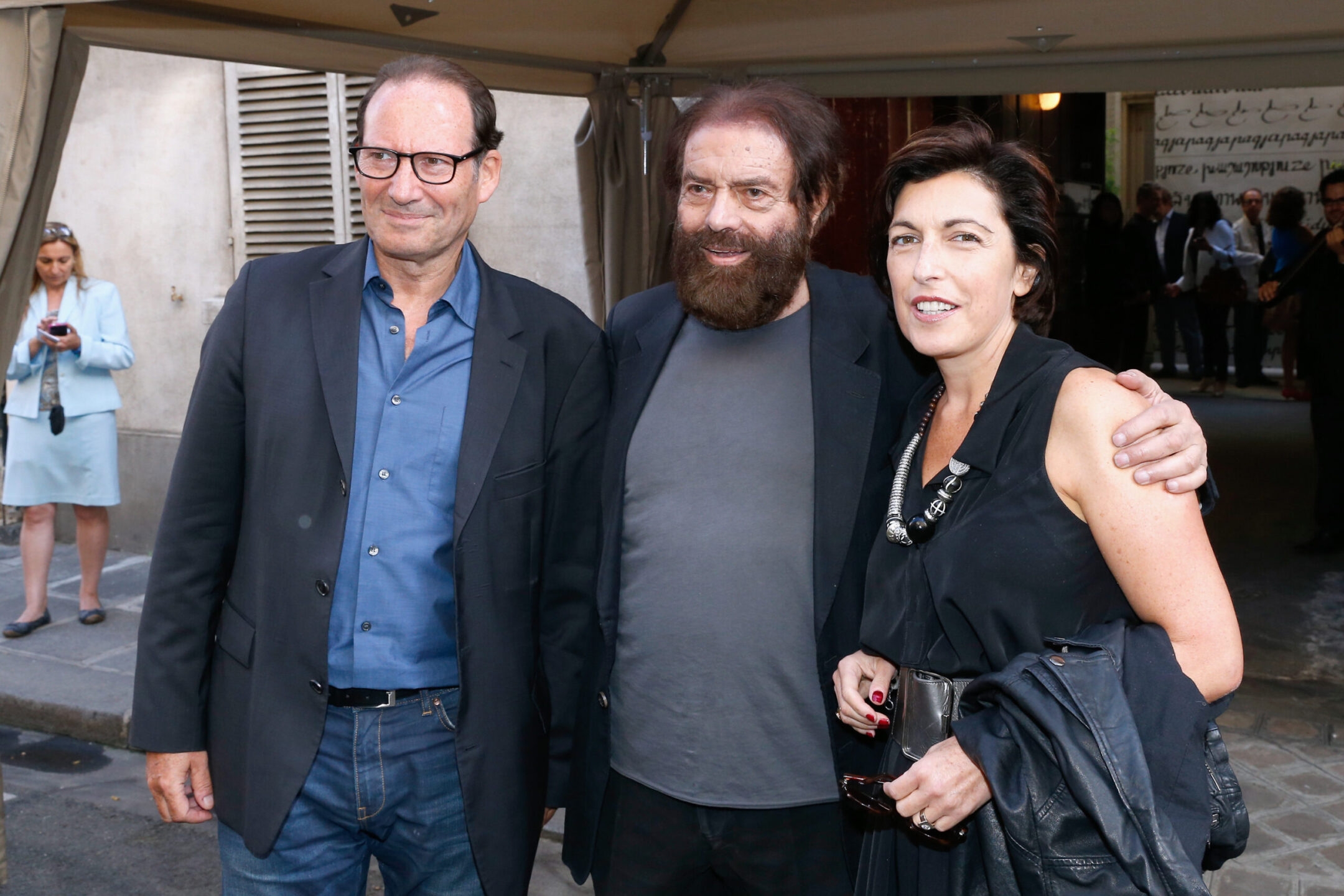
Ruth Elkrief and husband Claude Czechowski (at left) attend novelist Marek Halter’s Rosh Hashanah celebration for the Jewish new year at his home in Paris, Sept 8, 2013. (Bertrand Rindoff Petroff/Getty Images)
In all her years on air, Elkrief never spoke about her Jewish identity on TV before Oct. 7. She felt obliged to keep a “poker face” about her private life until the Hamas attacks, when she was moved to share more — fueled by her fear of rising antisemitism and enabled by her recent position as a commentator.
“I could explain where I was coming from and how much I was anxious about antisemitism in France after the 7th of October,” said Elkrief. “I called it my ‘coming out.’ I’ve since had some opportunities to speak about the conflict as a French editorialist, but also as a French Jew, for the first time in my life.”
On Oct. 9, Elkrief told her viewers that she was born in Morocco and lived there until early 1974, when she was 13. Her parents, both descended from generations of Moroccan Jews, feared regional tensions in the aftermath of the 1973 Yom Kippur War, when Israel fended off attacks from Arab countries. They went to France because they believed their children would have a safer life there.
“When I came at that time, I couldn’t imagine that there would be antisemitism in France,” Elkrief told JTA.
Worried about antisemitism gaining currency in French politics, Elkrief has criticized far-left factions heavily on her show. In addition to her dispute with Bompard, she blasted LFI for boycotting a march against antisemitism in November.
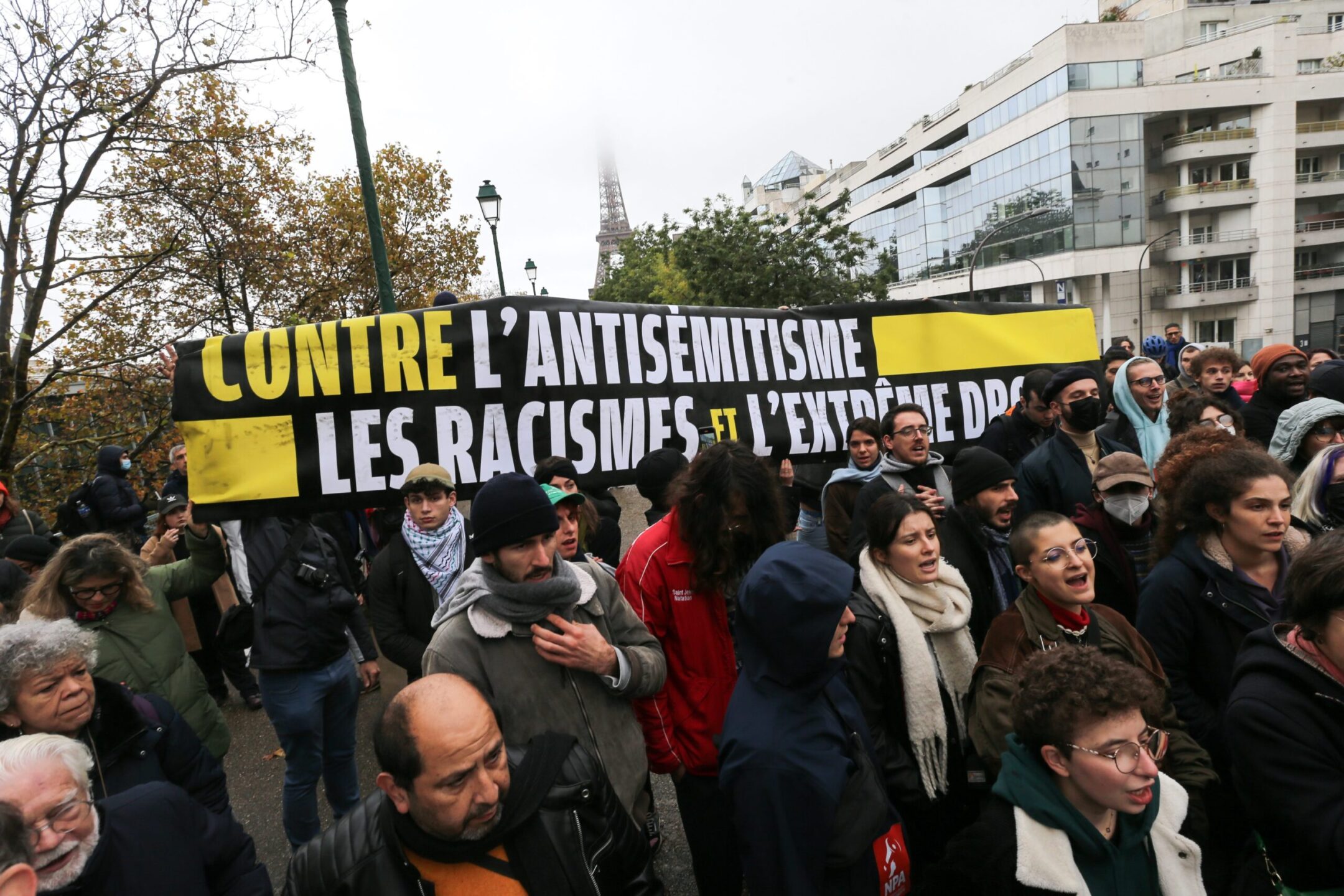
Demonstrators carry a banner reading “Against antisemitism, racism and the extreme right” during a rally at the Square des Martyrs Juifs in Paris, Nov. 12, 2023. (Michel Stoupak/NurPhoto via Getty Images)
France’s traditional left, which encompasses socialist and communist parties, has nearly collapsed and left the more radical, controversy-dogged LFI in power, said Wieviorka. Meanwhile, the far-right National Rally — including anti-immigration leader Marine Le Pen, whose father and predecessor is a convicted Holocaust revisionist — has escaped the same censure for antisemitism during Israel’s war on Gaza, largely by proclaiming support for Israel.
“My idea is that they hate Arabs, Islam and migrants so much that they consider they have to be fighting on the other side,” said Wieviorka.
Bell cautioned against focusing exclusively on what is often described as the “new antisemitism” on the far left. The “old antisemitism” on the far-right never went away, he argued, but has only been masked by pro-Israel sentiment. Indeed, Bell said that historically antisemitic tropes — particularly those depicting an invasion of Jews too different or unassimilable to become truly French — have merely been recycled by the far-right to stigmatize Muslim immigrants.
And even if this narrative now primarily targets Muslims, Jews are not free from the conspiratorial discourse, said Bell. He pointed out that while members of the National Rally may not explicitly attack Jews, they sometimes use euphemisms for Jewish “elites” whom they blame for engineering mass migration, in a French version of the “great replacement” theory that has fueled violence around the world.
“When Marine Le Pen talks about ‘cosmopolitan nomads’ who are encouraging migration and destroying European nations, she has a tendency to mention Jewish French political figures — Jacques Attali, Daniel Cohn-Bendit,” said Bell. “I don’t think that’s an accident.”
Elkrief and Mélenchon have one thing in common: They are both among the estimated 836,000 Moroccan immigrants in France. (Mélenchon, 72, was born in Tangier and lived there until he was 12.) Elkrief said she is a strong believer in the “Republic,” which in France denotes an idea that there are only equal individuals in the public sphere, no minorities or ethnic groups. The country’s principle of “laïcité,” loosely and imprecisely translated as “secularism,” enshrines in French law the state’s neutrality between religions and confines religious symbols and practices to the private sphere — a pillar that Elkrief believes can protect France from discrimination against both Jews and Muslims.
“I don’t want to be defined by my religion, and I don’t want other French people to be defined by their religion,” said Elkrief. “I believe in the French Republic staying a space of debate, where religion is a private question.”
This article originally appeared on JTA.org.



